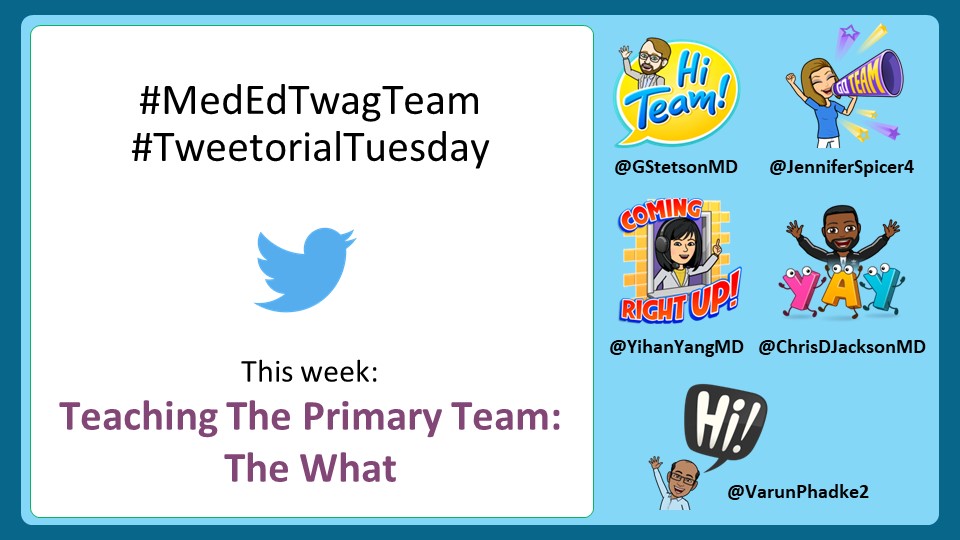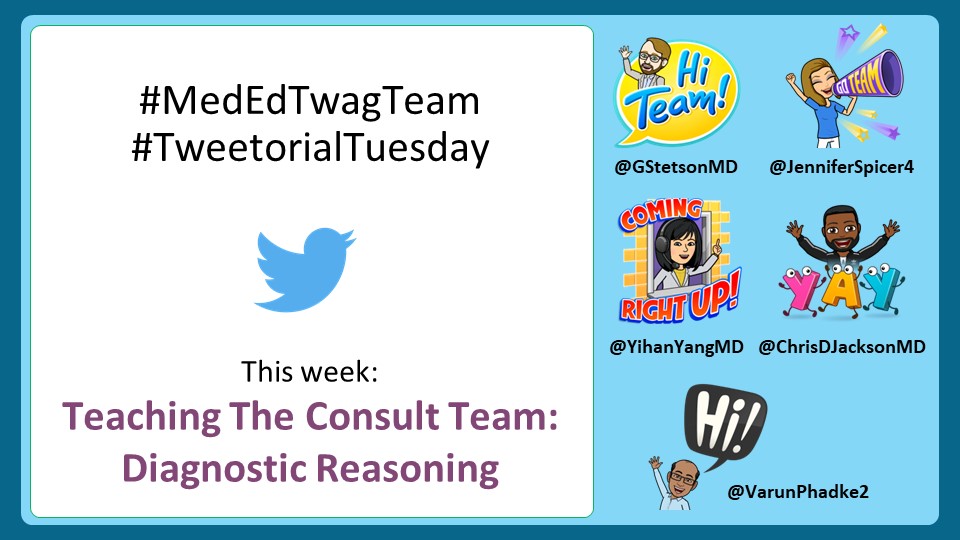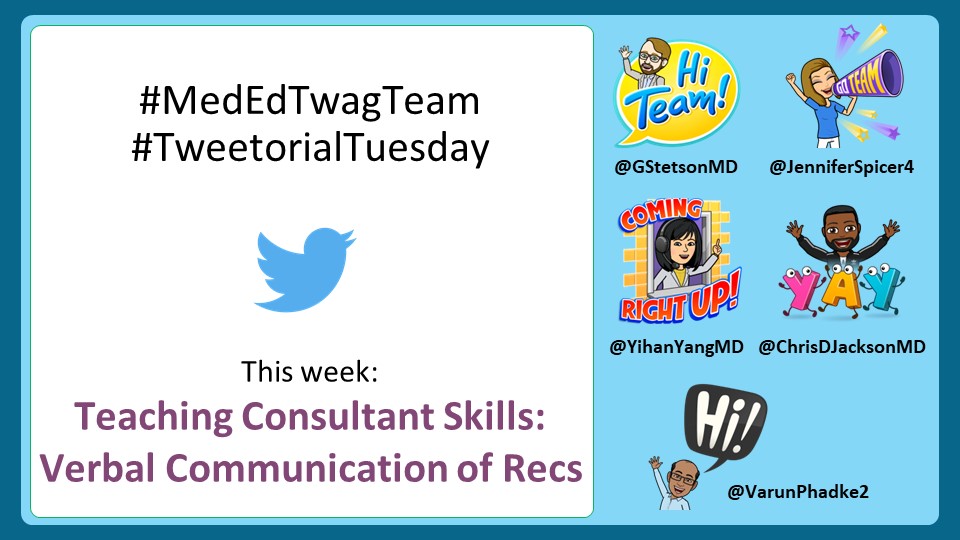1/ Ready for another #TweetorialTuesday from the @MedEdTwagTeam? Say no more #MedEd #MedTwitter friends!
This week we are launching our series on #SubspecialtyTeaching!
This week we are launching our series on #SubspecialtyTeaching!

2/ If you’re a clinical teacher in a subspecialty & wanted to incorporate pearls from #TweetorialTuesday, you've probably said to yourself (like I did):
WHEN? My days have ZERO predictability
WHAT? My learners are all at a VERY different place
WHO? My team seems to change QOD
WHEN? My days have ZERO predictability
WHAT? My learners are all at a VERY different place
WHO? My team seems to change QOD
3/ In this series @JenniferSpicer4 and I will share strategies for YOU, focusing on teaching as a [sub]specialist.
Our scope:
🌟 Teaching as an inpatient CONSULTANT
🌟 Teaching the CONSULT team (team hoping to provide help)
🌟 Teaching the PRIMARY team (team asking for help)
Our scope:
🌟 Teaching as an inpatient CONSULTANT
🌟 Teaching the CONSULT team (team hoping to provide help)
🌟 Teaching the PRIMARY team (team asking for help)
4/ Let’s start with some questions:
What is the BIGGEST challenge to teaching your OWN team in your role as a consultant?
(If the poll doesn’t capture your answer, Tweet us!)
What is the BIGGEST challenge to teaching your OWN team in your role as a consultant?
(If the poll doesn’t capture your answer, Tweet us!)
5/ What is the BIGGEST challenge to teaching the PRIMARY team in your role as a consultant?
(If the poll doesn’t capture your answer, Tweet us!)
(If the poll doesn’t capture your answer, Tweet us!)
6/ There are multiple unique challenges to teaching as a specialty consultant.
Let’s unpack a few of these as a prelude to future threads…
(This list is NOT meant to be exhaustive. Please Tweet us the challenges you struggle with to help define content you want to see!)
Let’s unpack a few of these as a prelude to future threads…
(This list is NOT meant to be exhaustive. Please Tweet us the challenges you struggle with to help define content you want to see!)
7/ Challenge #1 – Time
Consult teams often have a totally different flow to their day than inpatient teams. Why?
📈 Workload (aka consults) unpredictable and often without a “cap”
⚖️ Competing patient care activities & inpatient consults (specialty clinic, procedures, etc)
Consult teams often have a totally different flow to their day than inpatient teams. Why?
📈 Workload (aka consults) unpredictable and often without a “cap”
⚖️ Competing patient care activities & inpatient consults (specialty clinic, procedures, etc)
8/ Challenge #2 – Wide spectrum of learners
Subspecialty teachers must modulate their expectations & teaching for many learners…
⭐️ Learners on the CONSULT team
⭐️ Learners on the PRIMARY team
⭐️ Learners on OTHER teams (other consultants!)
All w/ different schedules!
Subspecialty teachers must modulate their expectations & teaching for many learners…
⭐️ Learners on the CONSULT team
⭐️ Learners on the PRIMARY team
⭐️ Learners on OTHER teams (other consultants!)
All w/ different schedules!
9/ Challenge #3 – Meta-cognition
Specialists usually encounter patients after some workup & management has already occurred. Effective consultation is thus intrinsically metacognitive.
Being mindful of what *others* were or are thinking influences WHAT and HOW to teach.
Specialists usually encounter patients after some workup & management has already occurred. Effective consultation is thus intrinsically metacognitive.
Being mindful of what *others* were or are thinking influences WHAT and HOW to teach.
10/ Challenge #4 – Different role
A specialist’s involvement in a case is usually “invited” & NOT the default. This comes with implications for etiquette about how to establish your role (aka “the consult question”), decision-making, & communication.
These are LEARNED skills!
A specialist’s involvement in a case is usually “invited” & NOT the default. This comes with implications for etiquette about how to establish your role (aka “the consult question”), decision-making, & communication.
These are LEARNED skills!
11/ Challenge #5 – Uncertainty
All clinicians deal w/ uncertainty. But specialists are often asked to adjudicate decisions b/c they have more cumulative EXPERIENCE w/ problem with no right answer.
Specialists must be mindful of how INDIVIDUAL practice influences teaching!
All clinicians deal w/ uncertainty. But specialists are often asked to adjudicate decisions b/c they have more cumulative EXPERIENCE w/ problem with no right answer.
Specialists must be mindful of how INDIVIDUAL practice influences teaching!
12/ Many of these challenges affect BOTH generalists & specialists.
We'll focus on aspects that uniquely impact teaching as a specialist in the consultant role.
What others would YOU add?
(We would especially love the perspective of our procedural colleagues!)
We'll focus on aspects that uniquely impact teaching as a specialist in the consultant role.
What others would YOU add?
(We would especially love the perspective of our procedural colleagues!)

13/ Next week @JenniferSpicer4 will be discussing how to structure your day on consults to get work done AND teach.
And check out #SubspecialtyTeaching @MedEdTwagTeam if you want to keep up with all our threads in one place!
Thanks for joining, and we will see you next week!
And check out #SubspecialtyTeaching @MedEdTwagTeam if you want to keep up with all our threads in one place!
Thanks for joining, and we will see you next week!

• • •
Missing some Tweet in this thread? You can try to
force a refresh











